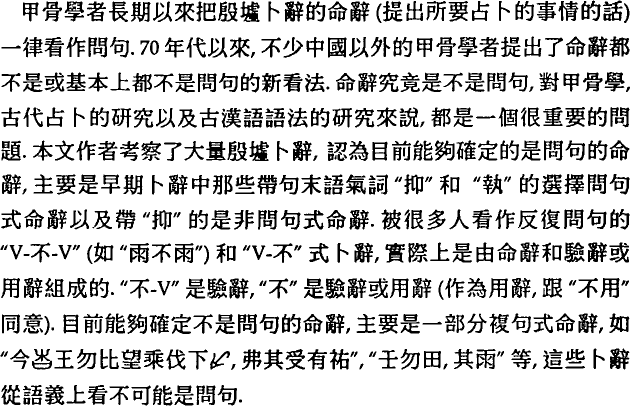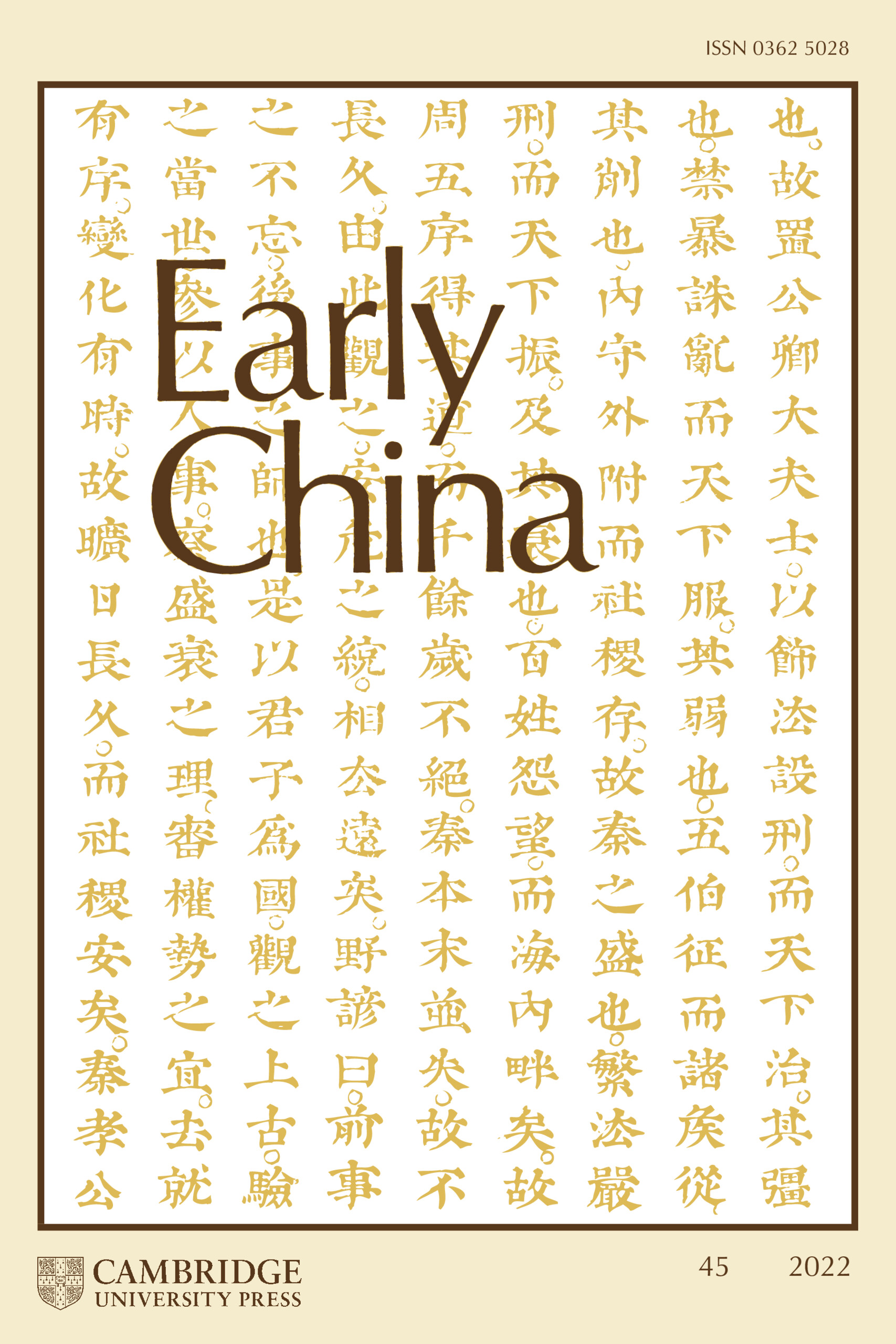Article contents
The Early China Forum An Examination of Whether the Charges in Shang Oracle-Bone Inscriptions are Questions*
Published online by Cambridge University Press: 26 March 2015
Extract
Oracle-bone scholars have long uniformly read the charges (i.e., the portion that mentions the event being divined) of Shang oracle-bone inscriptions as questions. Since the 1970's, many foreign oracle-bone scholars have proposed a new view that the charges are never questions, or at least are generally not questions. Whether or not the charges are actually questions is a very important question bearing not only on oracle bone studies, but also on research on ancient divination and on ancient Chinese grammar. Based on an examination of a great number of Shang oracle-bone inscriptions, the author of this essay believes that charges that can now be determined to be questions are mainly those choice-type charges in early inscriptions that contain the final particles yi and zhi
and zhi , and true-or-false type charges that contain yi. Charges of the type “V bu
, and true-or-false type charges that contain yi. Charges of the type “V bu V” (such as “rain not rain” [yu bu yu
V” (such as “rain not rain” [yu bu yu ]) and “V bu,” regarded by many as choice-type questions, are actually comprised of the charge and a verification or use notation, the “bu V” being a verification and the “bu” being either a verification or a use notation (similar to the notation bu yong
]) and “V bu,” regarded by many as choice-type questions, are actually comprised of the charge and a verification or use notation, the “bu V” being a verification and the “bu” being either a verification or a use notation (similar to the notation bu yong , “do not use”). Charges that can now be determined not to be questions are mainly in those inscriptions with complex charges, such as “this *spring the king ought not ally with Wang Cheng to attack Xia Wei, (for if he does) he will not receive divine assistance” (jin ?chun wang wu bi Wang Cheng fa Xia? Wei, fu qi shou you you
, “do not use”). Charges that can now be determined not to be questions are mainly in those inscriptions with complex charges, such as “this *spring the king ought not ally with Wang Cheng to attack Xia Wei, (for if he does) he will not receive divine assistance” (jin ?chun wang wu bi Wang Cheng fa Xia? Wei, fu qi shou you you , and “On ren we ought not hunt, (for if we do) it will rain” (ren wu tian, qi yu
, and “On ren we ought not hunt, (for if we do) it will rain” (ren wu tian, qi yu ), the syntax of which shows that they cannot be questions.
), the syntax of which shows that they cannot be questions.

Information
- Type
- Forum
- Information
- Copyright
- Copyright © Society for the Study of Early China 1989
References
* This paper was presented to the “International Conference on China's Yin-Shang Culture” (Anyang, China; 12 September 1987), was subsequently published in a somewhat revised form as “Guanyu Yinxu buci de mingci shi fou wenju de kaocha” ![]() , Zhongguo yuwen
, Zhongguo yuwen
![]() 1988.1, 1-20
Google Scholar, and is here translated by Edward L Shaughnessy. The translation, which was initially prepared on the basis of the conference paper, includes some changes other than those found in the published version, the most important of which is a considerable reduction in the number of example inscriptions cited. In all cases these revisions and deletions have been approved by Professor Qiu, who has carefully reviewed the entire translation. — Ed.
1988.1, 1-20
Google Scholar, and is here translated by Edward L Shaughnessy. The translation, which was initially prepared on the basis of the conference paper, includes some changes other than those found in the published version, the most important of which is a considerable reduction in the number of example inscriptions cited. In all cases these revisions and deletions have been approved by Professor Qiu, who has carefully reviewed the entire translation. — Ed.
1. David N. Keightley, “Shih cheng: A New Hypothesis about the Nature of Shang Divination,” paper presented to the conference “Asian Studies on the Pacific Coast,” Monterey, California, 17 June 1972.
2.
Lefeuvre, Jean A., Faguo suo cang jiagu lu
![]() ; Collections d'inscriptions oraculaires en France (Taipei: Ricci Institute, 1985), 295
Google Scholar.
; Collections d'inscriptions oraculaires en France (Taipei: Ricci Institute, 1985), 295
Google Scholar.
3. Serruys, Paul L-M, “Studies in the Language of the Shang Oracle Inscriptions,” Toung Pao LX.1-3 (1974), 21ffGoogle Scholar.
* This paper, heretofore unpublished, is presented in its entirety below, pp. 115-25. — Ed.
4. Shaughnessy, Edward L., “The Composition of the Zhouyi ” (Ph.D. diss.: Stanford University, 1983), 52-57, 66-67Google Scholar.
5. Shaughnessy, “The Composition of the Zhouyi,” 58-59, 76-78, etc.; see, too, his Chinese text “Shishi Zhouyuan buci xin zi—jianlun Zhoudai zhenbu zhi xingzhi” ![]() , Guwenzi yanjiu
, Guwenzi yanjiu
![]() 16 (in press).
16 (in press).
6. Lefeuvre, Faguo suo cang jiagu lu, 123-26.
7.
Xueqin, Li, “Xulun Xi-Zhou jiagu” ![]() , Zhongguo yuwen yanjiu
, Zhongguo yuwen yanjiu
![]() 7 (1984), 1-8
Google Scholar;
Renwen zazhi
7 (1984), 1-8
Google Scholar;
Renwen zazhi
![]() 1986.1, 68-72
Google Scholar.
1986.1, 68-72
Google Scholar.
8.
Xueqin, Li and Yuxin, Wang
![]() , “Zhouyuan buci xuanshi”
, “Zhouyuan buci xuanshi” ![]() , Guwenzi yanjiu
3 (1980), 250
Google Scholar.
, Guwenzi yanjiu
3 (1980), 250
Google Scholar.
9.
Xueqin, Li, “Xi-Zhou jiagu de jidian yanjiu” ![]() , Wenwu
1981.9, 8
Google Scholar.
, Wenwu
1981.9, 8
Google Scholar.
10. Li Xueqin, “Xulun Xi-Zhou jiagu” (Renwen zazhi ed.), 71.
11. Li Xueqin, “Xulun Xi-Zhou jiagu” (Renwen zazhi ed.), 71.
12. Nivison, “The ‘Question’ Question,” 120.
* It has not been possible to maintain such neutrality in the translation. In all cases I have attempted to represent the syntax as explained by Professor Qiu in the main body of his text. It should also be noted that for readers who wish to refer to the published Chinese version, inscriptions will be numbered here as in that version even though the deletion of some examples will result in lacunae in the numbering. Finally, it should also be noted that within the inscriptions translated here there are occasional words the meaning of which is uncertain to Professor Qiu and to the translator; tentative translations of these words are marked with an initial question mark. — Ed.
13.
Xueqin, Li, “Guanyu Duizu buci de yixie wenti” ![]() , Guwenzi yanjiu
3 (1980), 39-42
Google Scholar.
, Guwenzi yanjiu
3 (1980), 39-42
Google Scholar.
14. Li Xueqin, “Guanyu Duizu buci,” 41.
15.
Moruo, Guo, Yinqi cuibian kaoshi
![]() (Tokyo: Bunkyūdō, 1937), 66
Google Scholar.
(Tokyo: Bunkyūdō, 1937), 66
Google Scholar.
16. Serruys, “The Language of the Shang Oracle Inscriptions,” 23.
17.
Li, Wang
![]() , Hanyu shi gao
, Hanyu shi gao
![]() (Beijing: Zhonghua shuju, 1980), vol. 2, 449
Google Scholar.
(Beijing: Zhonghua shuju, 1980), vol. 2, 449
Google Scholar.
18. Li Xueqin, “Guanyu Duizu buci,” 39-40.
19. Li Xueqin, “Guanyu Duizu buci,” 42.
20. Mengjia, Chen, Yinxu buci zongshu (Beijing: Kexue chubanshe, 1956), 87 Google Scholar.
21. Shuxiang, Lu, Zhongguo wenfa yaolüe (Shanghai: Shangwu yinshuguan, 1956), 287 Google Scholar.
22.
Chuntian, Feng
![]() , “Qinmu zhujian xuanze wenju fenxi”
, “Qinmu zhujian xuanze wenju fenxi” ![]() , Yuwen yanjiu
, Yuwen yanjiu
![]() 1987.1
Google Scholar.
1987.1
Google Scholar.
23. Nivison, “The ‘Question’ Question,” 118 ff.
24. Li Xueqin, “Guanyu Duizu buci,” 34.
25. Nivison, “The ‘Question’ Question,” 121.
26. Nivison, “The ‘Question’ Question,” 122 ff.
27. Nivison, “The ‘Question’ Question”, 123 ff.
28. I should add a note here regarding the use of the word shang
![]() in the introduction to divination sentences, which I am afraid also does not prove semantically that they absolutely cannot be questions. In the “Tan gong”
in the introduction to divination sentences, which I am afraid also does not prove semantically that they absolutely cannot be questions. In the “Tan gong” ![]() chapter of the Liji
chapter of the Liji
![]() , there is the following question:
, there is the following question:
![]()
Would that the will of the master be put into effect?
Zheng Xuan's ![]() note states that “Shang means shuji
note states that “Shang means shuji
![]() .” In classical Chinese it is very common to find questions introduced with either shu
.” In classical Chinese it is very common to find questions introduced with either shu
![]() or shuji.
or shuji.
29. In both the section on “Abbreviated Sentences” in
Shuda, Yang
![]() , Gaodeng guowenfa
, Gaodeng guowenfa
![]() (Shanghai: Shangwu yinshuguan, 1955)Google Scholar, and in
Fagao, Zhou
(Shanghai: Shangwu yinshuguan, 1955)Google Scholar, and in
Fagao, Zhou
![]() , “Shanggu yufa zhaji — (er): ‘wei wu’ jie”
, “Shanggu yufa zhaji — (er): ‘wei wu’ jie” ![]() , Bulletin of the Institute of History and Philology
22 (1950)Google Scholar, there are discussions of this type of sentence, to which the reader is referred.
, Bulletin of the Institute of History and Philology
22 (1950)Google Scholar, there are discussions of this type of sentence, to which the reader is referred.
30. Nivison, “The ‘Question’ Question,” 118 ff., 125; Shaughnessy, “The Composition of the Zhouyi,” 52-53.
31. Shaughnessy, “The Composition of the Zhouyi,” 56,67.
- 5
- Cited by

